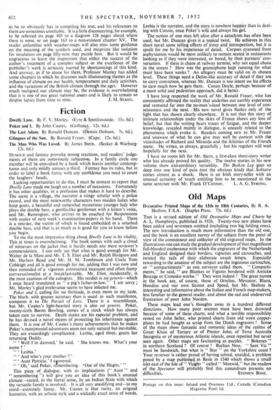Fiction
HUMOUR and fantasy provoke strong reactions, and readers' judge- ments of them are notoriously subjective. In a family circle one member will be convulsed by a book which leaves another contemp- tuous and only mildly amuses a third. Fantasy has its rules, but in order to label a book funny with any confidence you need to count the laughers' heads.
Lacking opportunities to do this, I must be content to report that Dwelly Lane made me laugh on a number of occasions. Fortunately it has other qualities, in a profusion that makes it hard to describe. The scene is a village, the narrator a stingy scholar with a police record, and the most noteworthy characters two maiden ladies who keep goats, a beautiful and somewhat mysterious younger lady who plays the double bass, a gorilla-like gentleman with a kitten's voice, and Mr. Remington, who arrives to be coached for Responsions with copies of next week's examination-papers in his hand. There is a murder, the victim of which is found embedded in a smashed double bass, and that is as much as is good for you to know before you begin.
To me the most impressive thing about Dwelly Lane is its vitality. This at times is overwhelming. The book comes with such a cloud of witnesses on the jacket that it hardly needs any mere reviewer's commendation. I can only say that what is good enough for Mr. Walter de la Mare and Mr. T. S. Eliot and Mr. Ralph Hodgson and Mr. Herbert Read and Mr. H. M. Tomlinson and Uncle Tom Cobleigh and all is good enough for me, adding that I was now and then reminded of a vigorous extroverted incessant and often funny conversationalist at a breakfast-table. Mr. Eliot, incidentally, is the most cautious of the eulogists. His verdict is sui generis—which I once heard translated as " a pig's father-in-law." I am sorry ; Mr. Morley's glad irrelevance seems to have infected me.
Poker and I, calling for no fortitude, is even more to my taste. The blurb, with greater accuracy than is usual in such manifestos, compares it to The Pursuit of Love. There is a resemblance, but Mr. Coates's light-hearted story is also sui generis. Poker, twenty-sixth Baron Bowling, comes of a stock which has always taken care to survive. Death duties are his especial problem, and he has devised a novel means of protecting his inheritance against them. It is one of Mr. Coates's many achievements that he makes Poker's matrimonial adventures seem not only natural but inevitable. They are exceedingly complicated. Lesbia, aged three, greets her returning Daddy. " Well I'm damned,' he said. ` She knows me. What's your name ? '
" Lesbia.'
" ` And who's your mother ? '
" ` Aunt Patricia,' I agswered. " Oh,' said Poker, n!membering. 'One of the Illegits.' " This piece of dialogue, with its implications (" Aunt " and " remembering ") will give you an idea of this book's unusual climate—varied, in the literal sense, by an Indian State with which the versatile family is involved. It is all very unedifying and—to my mind—extremely funny. Mr. Coates is that rarity, an original humorist, with an urbane style and a wickedly exact sense of words. Lesbia is the narrator, and the story is nowhere happier than in deal- ing with Connie, once Poker's wife and always his girl.
The notion of one man left alive after a cataclysm has often been used, but Mr. Duncan gives it a topical twist. He achieves in this short novel some telling effects of irony and introspection, but it is spoilt for me by his impatience of detail. Corpses cyanosed from asphyxiation would be most unlikely to remain seated in restaurants looking as if they were interested, or bored, by their partners' con- versation. If there is chaos at railway termini, why not equal chaos in the streets ? How was the gramophone kept running for what must have been weeks ? An allegory must be valid on its chosen level. These things need a Defoe-like accuracy of detail if they are to carry conviction, whereas Mr. Duncan is too intent on his effects to care much how he gets them. Conan Doyle, perhaps because of a more solid and pedestrian approach, did it better.
I have long respected the work of Mr. Ronald Fraser, who has consistently affirmed the reality that underlies our earthly experience and ventured far into the no-man's-land between one level of con- sciousness and the next. -'His new novel gives flashes only of the light that has shown clearly elsewhere. It is not that this story of intimate relationships under the skies of France shows any loss of belief, but that the writing bears traces of fatigue, and the deeper knowledge, revealed mainly in dialogue, is uneasily related to the phenomena which evoke it. Readers coming new to Mr. Fraser and unaware of what he can give may well be content with the vicissitudes of Richard and Miranda and the felicities of the French scene. He writes, as always, gracefully ; but his regulars will wait hopefully for the next.
I have no room left for Mr. Stern, a first-class short-story writer who has already proved his quality. The twelve stories in his new volume show extraordinary versatility. The Broken Leg goes so deep into one kind of pain (not the obvious kind) that Solitaire comes almost as a shock. Here is an Irish story-teller with an unusual certainty of touch entitling him to be mentioned in the same sentence with Mr. Frank O'Connor. L. A. G. STRONG.


































 Previous page
Previous page